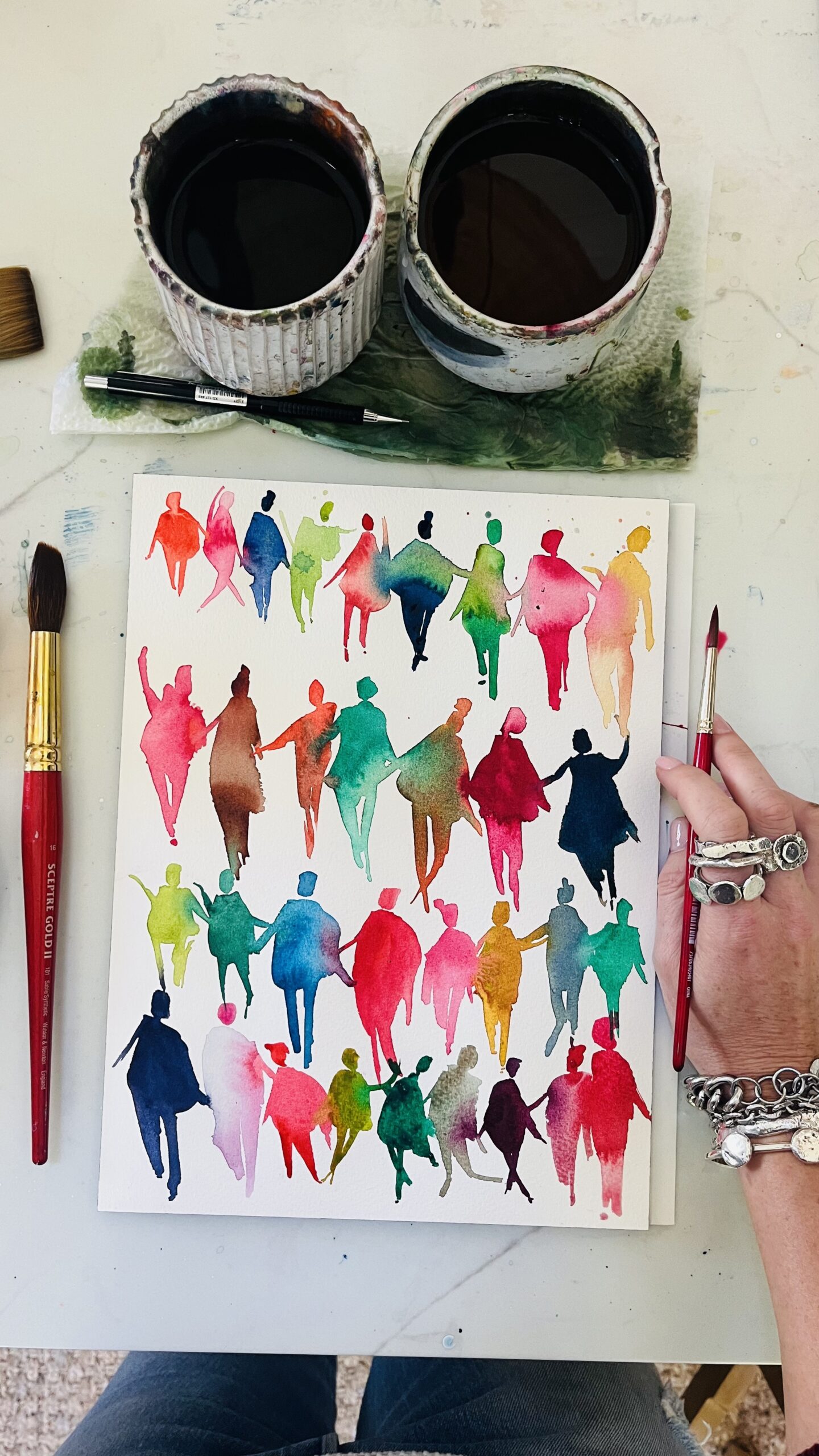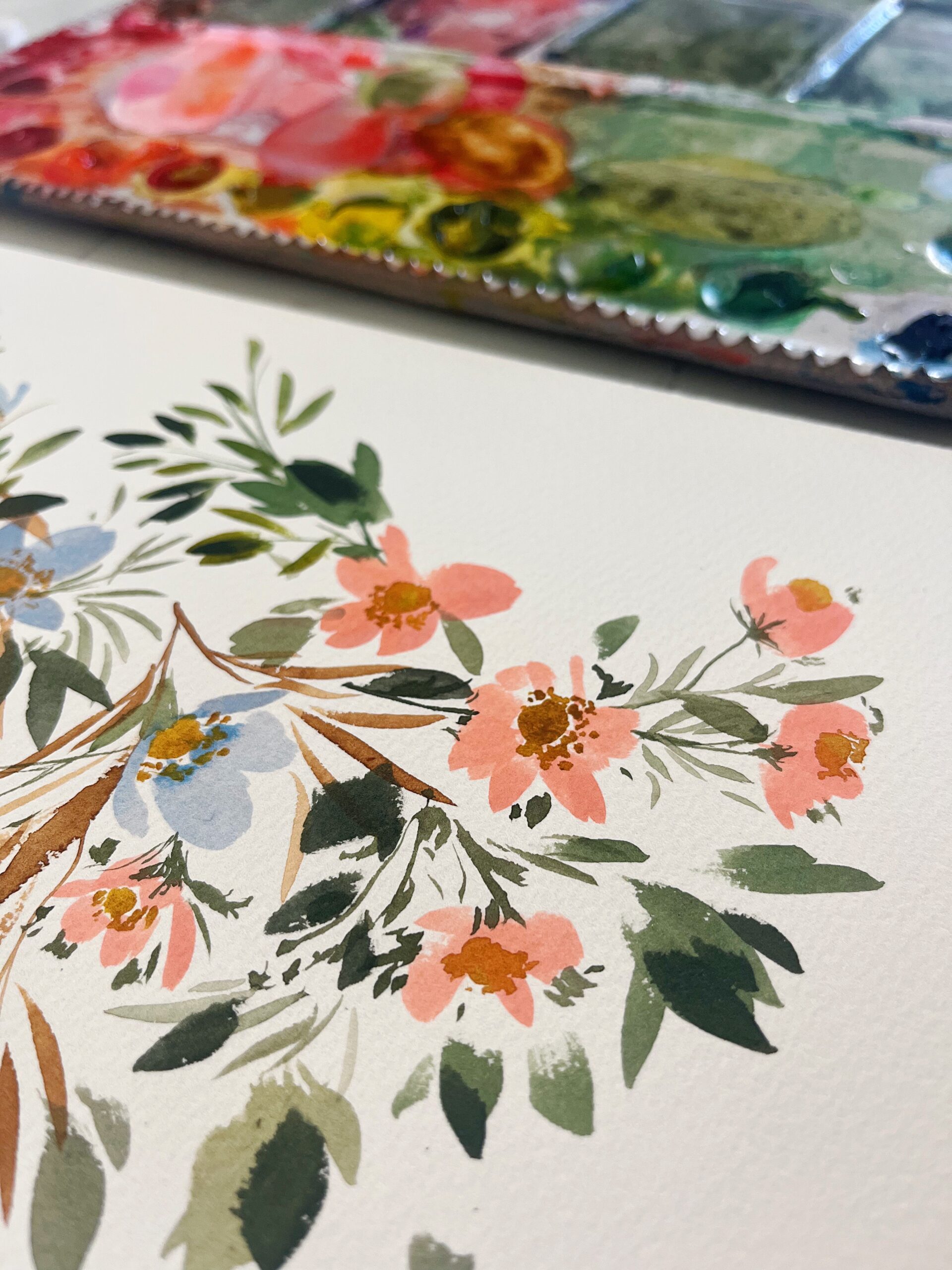Creative workshops…it's kind of a buzz word, right? For good reason! In one weekend, I can book ONE 3-hour class and walk away with $3K! And if you're like, “easy for you to say!”…well, this was the case even when I didn't have a following!
Six years ago, I was asked to teach my very first calligraphy workshop (you can see posts from my classes over the years HERE). I was only doing calligraphy for small jobs and some wedding clients at the time and had never taught before. Was I nervous? Absolutely. Did I know what I was doing? Nope! But the excitement took over and I taught anyway. Since then, I've taught hundreds of classes, I've traveled all over the world with supplies and I've taught my in-person creative workshops to thousands of students. Over the years I've made good money from classes and it's helped me position myself as an expert on topics like calligraphy and watercolor. It's lead to book deals, amazing partnerships and because of all the cross-promotion that goes on with classes, it's helped grow my audience exponentially over the years. But it wasn't always this way.
The first two years I was teaching multiple workshops a weekend, selling out every class, but barely making a profit. Between the cost of materials, the time I was putting in to prepare for the class, and splitting some of the profit with the venue, it felt like the money I was making barely enough to pay for supplies. Because of this, I've learned a ton about pricing workshops and today I can sell out a class in a weekend and make over $2K AFTER expenses. So, in this post, I'm going to share with you the exact formula I use for pricing in-person workshops
Price = Value + Time
What does this mean? First things first, KNOW WHAT IT COSTS.
Sounds obvious, but what are your costs of goods? For all of my workshops, I purchase every material at wholesale cost. If you've read this blog post, you'll know that my workshop materials are NOT cheap. But no matter how much your material costs are, this is so important. If you're buying supplies at retail, you have very little to no margin to mark that up and make money. This is where I see a lot of new workshop teachers go wrong. So, get a sellers permit and start buying your supplies at wholesale. Your time spent sourcing, ordering, packaging, transporting supplies, etc. should be compensated.
Next up, CHARGE FOR YOUR TIME!
Putting a dollar amount on your time is tricky. But you have to evaluate and ask yourself, how long does it take to put on a workshop? It isn't just about the 3 hours day of. There's time spent writing the curriculum, promoting the course on social media, your blog, email list, etc. It takes time to purchase and pack the supplies, traveling to and from the venue, etc. Estimate how many hours will go into this one workshop, and determine an hourly rate that seems suitable to your expertise. This “hourly rate” is personal, it's fluid, and there is not a right answer. But, you have to put a value on your time. It is a non-renewable resource that you cannot get back. So would you like to get paid $20/hour? $50/hour? What would be worth it to you? Once you add up those total numbers, you have your price…to give you a visual, here's a basic example:
So, here's how it works…
Once you mark up your cost of goods, really sit with and evaluate your curriculum. How valuable and sought after is the material you're teaching? Do you have an established reputation in this field? Someone like myself who's been teaching for over six years can charge more than someone who has never taught before or is new because of EXPERIENCE. I've paid my dues, I've built my audience and I've established myself as an expert, therefore I can put more value on my curriculum and what I teach. Next, add it up to the cost for your time.
Here's an actual example so you can see this formula in action:
Teaching a Beginner Level Watercolor Course for 20 Students:
Supply cost: $22.95/person (wholesale) = $36.72 (marked up by 60%) x 20 people (if class is sold out) = $734 + $venue fee (add this in even if they're going to take a percentage from each sale vs. have a flat fee. If they take a cut/percentage, determine a cost that includes this percentage being taken out, so you don't lose money!)
Hours: Total of about 22 hours at $75/hour (including teaching the class) = $1,650
Total Cost: Add up costs and divide by the number of students (20) = In this case, it'd be $119.20 before the venue fee. Let's say the venue wants to take 30% of ticket sales, add 30% to your $119.20 cost and you get $154.96! So, I'd round up and do $160/student!
Do you teach workshops? If so, try using this formula for your next class and see what you come up with! It will definitely vary per subject, the venue you partner with and even where you're located. Because there are so many people where I live, I know I can charge more vs. teaching in a small town because of the market! So, really sit with your workshop material, do your research and put this formula for pricing in-person workshops to the test!









Thank you so much for sharing a precise way of pricing! This is useful noy just for pricing workshops but for pricing any sort of freelance work. I’m sure it’ll be helpful for a lot of people!
Hey there! I’ve found this post to be SOOOO so useful! Thanks Jenna I think it’s amazing for you to share this experiencie with all of us. BTW I love your work and I find it very inspiring ❤️
Jenna, this was a very helpful article to help me determine the pricing for my workshops, so thanks so much for sharing.
I have a question about the formula: where did you come up with the $75.00 an hour fee? I didn’t see how you calculated this number.
Hi Jeaninne! It’s in the section under “Next up: Charge for your Time.” This number is personal and fluid!